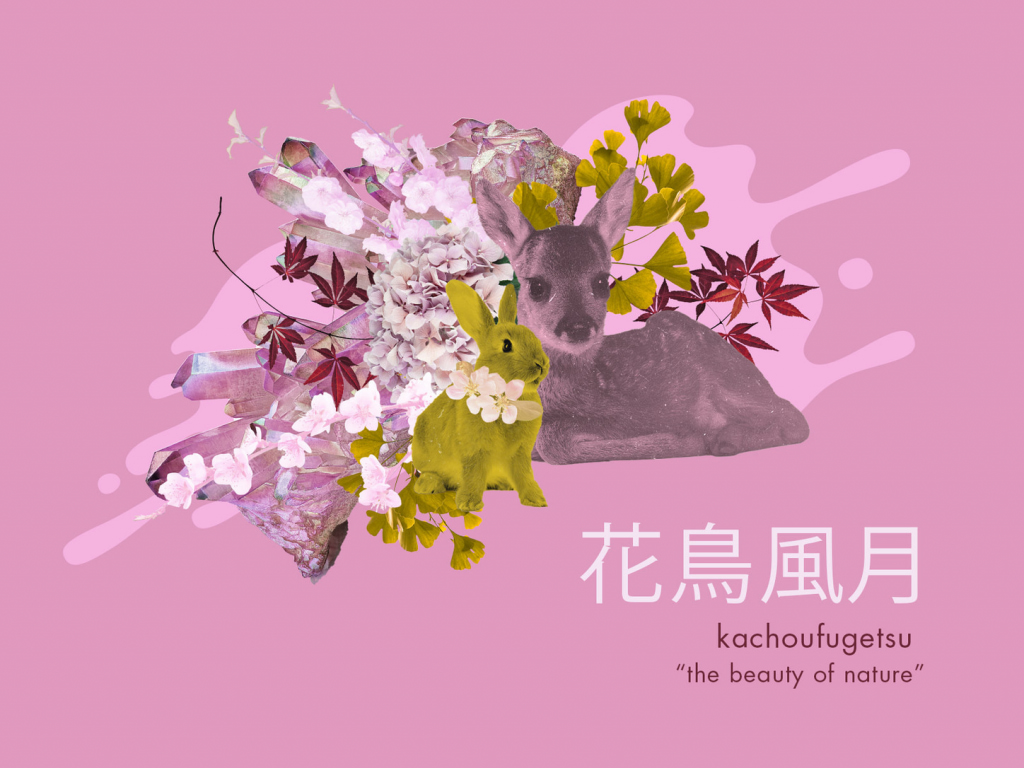As autumn draws closer and typhoons bluster through, the nights grow colder and ever so subtly, the leaves begin to change color. While Japan is not alone in the existence of four seasons (although some may argue that there are more than four), it does stand out in its attentiveness to their changes. This week we explore kachoufugetsu, an idiom that describes this appreciation of natural beauty.
Kachoufugetsu (花鳥風月)
Meaning: The beautiful features of natural scenery, the beauty of nature, artistic pursuits with natural themes, the wonders of nature, scenic nature
Literal translation and kanji breakdown: Kachoufugetsu has a very interesting composition: 花鳥風月 is literally: flower, bird, wind, moon. All of these words have an intimate connection with nature and together, it feels quite literal. You can picture a natural scene in your mind just by reading it.
花鳥 (kachou / flowers and birds) often appears as a two-kanji compound when referring to art or poetry themes. 花鳥画 (kachouga) or 花鳥図 (kachouzu) refers to a flower-and-bird genre within Japanese and Chinese paintings and 花鳥諷詠 (kachoufuei) is a key poetic theme of haiku, discussing the harmony that exists between man and the beauty of nature. As for 風月, the compound means nature’s beauty, though it literally details a cool breeze and a bright moon.
Kachoufugetsu: The Origins
Unlike many other yojijukugo idioms, kachoufugetsu’s primary source is of Japanese origin. It was a game aristocrats and samurai families played — they would compete through poems about beautiful natural sceneries they had encountered. One of the earliest written sources using the expression kachoufugetsu is Fushi Kaden, a treatise and acting guide on Noh written by Zeami Motokiyo during the Muromachi Period (1336-1573). At the time, kachoufugetsu was used to describe refined dignity or grace, though it gradually took on the meaning it has today: the beauty of nature.
As for modern usage, kachoufugetsu is often used when talking about a particular memory or expectation of a beautiful view rather than speaking about something one is looking at in the present. This may be why it’s a popular idiom for song and album titles. Spitz and Sekai no Owari are just two of many bands and artists that have borrowed the expression. Spitz named their 1999 album Kachoufugetsu, while Sekai no Owari used the same idiom as a song title in 2010.
Kachoufugetsu: Similar Expressions
- 春花秋月 Shunkashugetsu Each season has its own beauty, spring flowers and autumn moon, the beauty of nature as it changes between seasons.
- 風流韻事 Fuuryuinji Appreciating nature through elegant pursuits such as poetry, calligraphy and painting
- 一竿の風月 Ikkan no fugetsu With a fishing rod in hand; a metaphor for leaving worldly affairs and enjoying a leisurely life close to nature.
- 柳は緑花は紅 Yanagi wa midori hana wa kurenai Willows are green, flowers are crimson; natural state, unspoiled by human touch, nature is beautiful, all things have different natures or characteristics.
Using “kachoufugetsu” in a sentence
Kachoufugetsu is often used in combination with certain set phrases, such as を愛でる (wo mederu) or を友とする (wo tomo to suru).
花鳥風月を楽しむために、来週青森を旅します。Kachoufugetsu wo tanoshimu tameni, raishu Aomori wo tabi shimasu. I’m going to Aomori next week to enjoy the wonders of nature.
現代の生活には花鳥風月に親しむゆとりが欠けている。Gendai no seikatsu ni wa kachoufukei ni shitashimu yutori ga kaketeiru. Modern life lacks the luxury of just enjoying the beauty of nature.
Want more? Follow our weekly Yojijukugo Japanese Idiom series, published every Friday. Learn the meaning of “chinpunkanpun” here, “yudantaiteki” here and “furouchouju” here.









